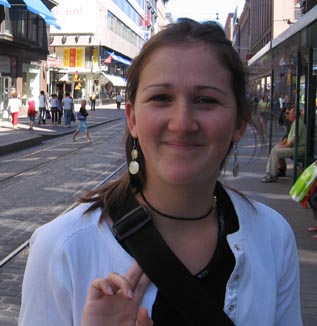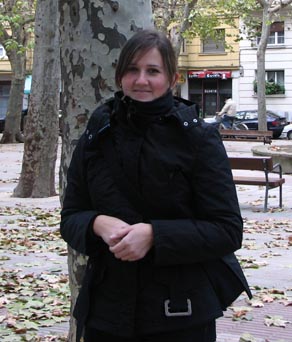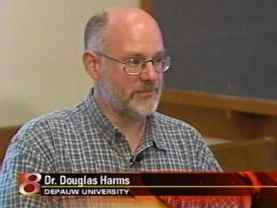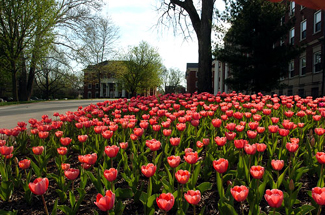Elin Raun '04 to Examine 'The Return of Estonia's Diaspora' With Fulbright Award
May 27, 2008
 May 27, 2008, Greencastle, Ind. - Elin P. Raun, a 2004 graduate of DePauw University, has been awarded a Fulbright U.S. Student scholarship. The grant will allow Raun -- who also earned a masters degree in modern European history from the University of Oxford (Magdalen College) in 2006 -- to travel to Estonia during the 2008-09 academic year to conduct research in the field of Estonian diaspora studies. Her project is entitled, "The Return of Estonia's Diaspora."
May 27, 2008, Greencastle, Ind. - Elin P. Raun, a 2004 graduate of DePauw University, has been awarded a Fulbright U.S. Student scholarship. The grant will allow Raun -- who also earned a masters degree in modern European history from the University of Oxford (Magdalen College) in 2006 -- to travel to Estonia during the 2008-09 academic year to conduct research in the field of Estonian diaspora studies. Her project is entitled, "The Return of Estonia's Diaspora."
Raun becomes the third member of the DePauw community to receive a Fulbright Award for the coming year. Eric M. Reese, a May 2008 graduate of DePauw University, will spend a year in South Korea teaching English to young people. Michele T. Villinski, James W. Emison III Director of the Robert C. McDermond Center for Management and Entrepreneurship and associate professor of economics and management at DePauw University, will have the opportunity to spend the upcoming year teaching environmental and natural resource economics and policy at Universitas Surabaya (UBAYA) in Surabaya, Indonesia.
Raun -- whose family emigrated from Estonia -- will focus on the impact of the diaspora both during the period the country was occupied by the Soviet Union in September 1944, as well as the period after it became independent in August 1991. "In particular, I will examine the relationship between those who fled and those who did not," she stated in her Fulbright application. Based in Tartu and affiliated with the University of Tartu, she will engage in archival research and conduct oral interviews. "My previous experience researching Estonian history and identity in the twentieth century will serve as a solid framework upon which my proposed research will build," she adds., noting that after her Fulbright experience, "I will either enter into a doctoral history program or a career in international  relations with a focus on promoting cross-cultural exchange."
relations with a focus on promoting cross-cultural exchange."
A double major in history and English writing at DePauw, Raun's senior thesis examined "Estonians in exile: Continuity and challenge." Her master's thesis was titled, "Displaced again: British policy on the repatriation and resettlement of Estonian displaced persons after World War II." (top photo: Raun in Spain; at left, in Helsinki, Finland)
"My research to date has centered primarily on Estonians outside of Estonia," Raun states. "Building on this knowledge, I plan to shift the focus of my research to the experience of the émigré’s return, both pre- and post-independence. I will examine the return diaspora from the perspective of the émigré’s and the Estonians who stayed. How do both parties communicate and, in turn, understand their different pasts during the Soviet period? In particular, I am interested in exploring the misunderstanding, distrust, and resentment that seem to pervade the relationship between those who fled and those who did not."
She adds, "My proposed research is significant for two main reasons. First, the human aspect of the Estonian return diaspora is yet to be told. Conventional twentieth century history teaches us about Hitler and Stalin and the Molotov-Ribbentrop pact, but what of the 22-year-old farmer who fled west? What about his story of returning to his siblings 30 years later and realizing they no longer understand each other because their individual  histories have, in fact, become divided? Second, my research will serve as a useful case study and allow for comparative studies of return diasporas throughout the former Soviet Union and relevant parts of Eastern Europe. Return migrants are a major, though often overlooked, theme in twentieth century European history. My research will make a valuable contribution to this emerging field."
histories have, in fact, become divided? Second, my research will serve as a useful case study and allow for comparative studies of return diasporas throughout the former Soviet Union and relevant parts of Eastern Europe. Return migrants are a major, though often overlooked, theme in twentieth century European history. My research will make a valuable contribution to this emerging field."
Raun made her first visit to Estonia in 2000, and writes that "would become the seed of my interest to study history at DePauw. I found myself drawn to history not only in a large narrative sense, but also on a smaller, human scale, which resulted in an additional major in non-fiction creative writing. As I studied world history, traveled abroad, and wrote, particularly a series of WWII survivors' life histories for my final writing seminar, I developed a passion to know and understand people throughout the world: their stories, their motivations, their hopes for the future."
She concludes, "By studying the relationship between émigré and non-émigré Estonians -- that is, two distinct groups within one nationality -- I hope to fulfill Fulbright's mission of promoting cross- cultural exchange and understanding. I look forward to the archival opportunities unique to Estonia and building relationships through the sharing of individual histories. Through these efforts, I hope to arrive, ultimately, at a better understanding of contemporary Estonian society."
understanding of contemporary Estonian society."
Douglas E. Harms, professor of computer science at DePauw and the University's Fulbright Program Adviser, says, "Elin has prepared herself well for this project; her family is Estonian and she is personally familiar with Estonian culture, language, and traditions; she has traveled to Estonia for short periods, studied Estonian history, researched and written undergraduate and graduate theses about displaced and exiled Estonians, and worked at the New York Estonian House. She has experience doing archival research and conducting oral interviews, and has developed a network of professional contacts both within and outside of Estonia. I find it difficult to imagine a more qualified candidate for this project."
Sponsored by the U.S. Department of State and established in 1946, the Fulbright U.S. Student Program competition aims to increase mutual understanding among nations through educational and cultural exchange while serving as a catalyst for long-term leadership development. It is the largest American international exchange program offering opportunities for students and young professionals to undertake international graduate study, advanced research, university teaching, and teaching in elementary and secondary schools worldwide. The U.S. Student Program currently awards approximately 1,500 grants annually in all fields of study, and operates in more than 155 countries worldwide. Since its inception 62 years ago, the Fulbright Program has provided more than 286,000 participants, chosen for their leadership potential, with the opportunity to observe each others' political, economic and cultural institutions, exchange ideas, and embark on joint ventures of  importance to the general welfare of the world's inhabitants. Learn more by clicking here.
importance to the general welfare of the world's inhabitants. Learn more by clicking here.
To contact Dr. Harms, the recipient of a Fulbright Award for the 2004-05 academic year, send an e-mail to dharms@depauw.edu.
DePauw was among the "Top Producers of Fulbright Awards for U.S. Students, 2007-08" according to a chart published in the October 26, 2007 edition of the Chronicle of Higher Education. The University continues to be one of the top colleges in the United States for the percentage of students who study abroad, according to Open Doors 2007, a report by the Institute of International Education.
